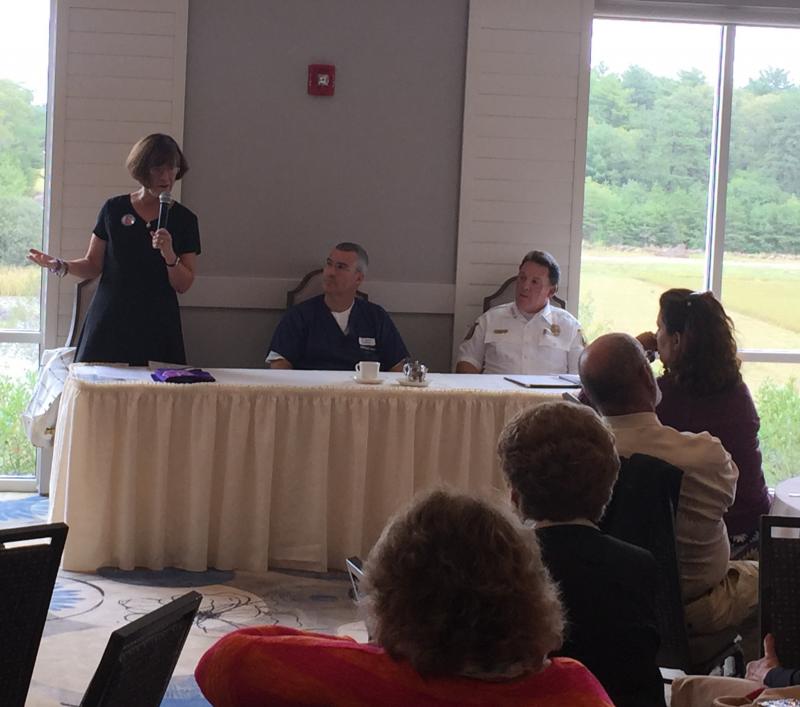Public safety, health officials discuss opioid epidemic
With one in seven people in the United States struggling with a substance abuse disorder, battling the epidemic may seem insurmountable. However, the solution starts with changing attitudes toward addiction, health and public safety officials stressed on Thursday.
“It’s unbelievable that so many people in this country are addicted or have a substance use disorder,” said Dr. David McGinnis, chair of Tobey Hospital’s Emergency Department. “The problem is that it’s seen as a moral failing…I would love for people to view it as an illness.”
McGinnis addressed the opioid epidemic at a public forum hosted by the Tobey Hospital Guild in the Rosebrook Event Center.
He spoke on behalf of the medical community and was part of a three-person panel assembled to discuss the epidemic.
Jeanne Flynn of Bourne spoke on behalf of families who are dealing with the issue. Flynn’s son Brian died as a result of a heroin overdose in 2015. Since then, she’s advocated for getting better insurance coverage for treatment, increasing services and changing how the criminal justice system treats addicts.
Wareham Police Chief Kevin Walsh represented law enforcement on the panel. Walsh echoed McGinnis’s call for action.
Since he joined the Wareham Police Department in 1985 Walsh said his views on heroin addicts have changed. Back then, heroin users were thought of as the worst class of drug user.
Since then, Walsh said he now sees users in a different light.
“This disease knows no boundaries,” said Walsh. “It will take over your life and the lives of your family and friends.”
Wareham has been particularly hard hit by the epidemic, said Walsh. Since January, police responded to 120 overdose calls. Of those 120 overdoses, 10 resulted in death.
Prevention is key said Walsh, who noted that a major announcement regarding the formation of a new, inter-agency task force to deal with the problem is forthcoming soon.
Locally, Walsh said police have several programs in the schools held throughout the year to spread awareness of the issue. He noted some children live with parents suffering from addiction.
“They have seen it firsthand as kids and that’s the saddest part of all,” said Walsh.
From a parent’s perspective, Flynn said watching her son fight his addiction for 10 years was heart wrenching.
“If you lose your parents, you’re an orphan; if you lose a husband you’re a widow,” said Flynn. “There is no name for someone who loses a child, but I call myself a lost mom.”
Flynn said she became aware her son had a problem when, at age 17, he suffered a seizure due to cocaine use.
Following that she said he spent years in and out of treatment and overdosed a total of 17 times before his fatal overdose.
Flynn said during that time it was difficult to know how to best help her son. She said is death served as a catalyst to help others in similar situations.
“We didn’t make him an addict and we couldn’t unmake him an addict,” said Flynn. “Hopefully I can use my voice to help others. The key is prevention.”














